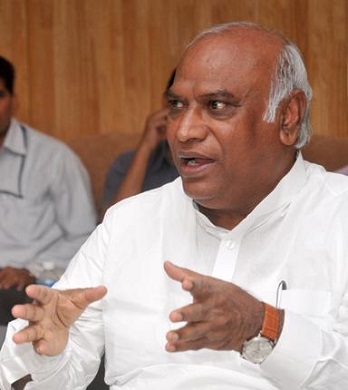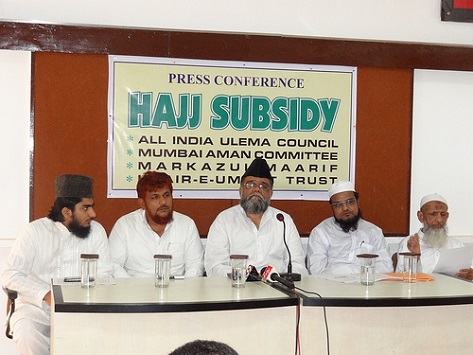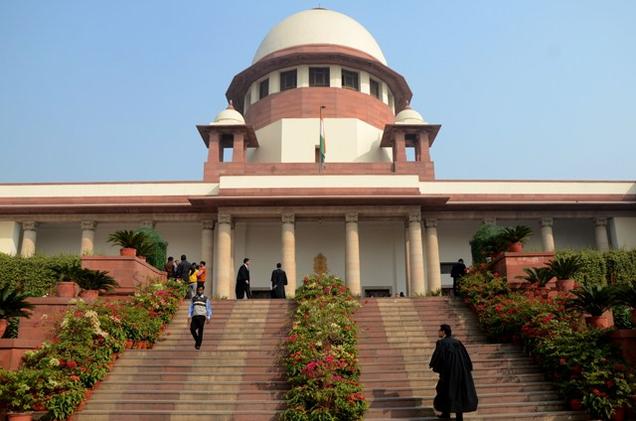When the country’s Home Minister, Rajnath Singh, opened the recent Parliamentary debate on “Commitment to the Constitution”, it took about ten minutes of thanks and tributes before he set the cat among the pigeons. He expressed his displeasure at the 42nd Constitution Amendment Act, 1976, introducing the word “secular” (apart from “socialistic”) in our Constitution’s Preamble and added that “secular” had now become the most abused word in Indian politics. And though he quickly said that his government stood committed to that change, howls emitted in the Lok Sabha.
 The leader of the Opposition, Malikarjun Kharge, pounced on him, accusing the government of being chronically allergic to the concept of “secular” India. Kharge went on to assert that Dr. Ambedkar wanted to introduce the word “secular” in his original official Draft Constitution but was prevented from doing so by certain quarters.
The leader of the Opposition, Malikarjun Kharge, pounced on him, accusing the government of being chronically allergic to the concept of “secular” India. Kharge went on to assert that Dr. Ambedkar wanted to introduce the word “secular” in his original official Draft Constitution but was prevented from doing so by certain quarters.
Now, it is well known that as Leader of the Opposition in the Lok Sabha for the last 17 months, Kharge of the Congress Party is almost genetically averse to the BJP, being invariably aggressively menacing and abusive in confronting the BJP, especially while he is facing the Doordarshan cameras when sitting next to him in the House is his Italian-born party president. But here’s hoping that Kharge is not so partisan and vicious as to doubt some recorded happenings mentioned below:
- When the Preamble to the Constitution was discussed in the Constituent Assembly on October 17, 1949, a Member, Brajeshwar Prasad from Bihar, moved that the first sentence of the Preamble should begin with “We the people of India, having resolved to constitute India into a secular (emphasis added) cooperative commonwealth to establish socialist (emphasis added) order and to secure to all its citizens…” His amendment was negatived, without a “division” being asked for and without even a show of hands. And the records of that debate do not show Dr. Anbedkar expressing any opinion at all on the Honourable Mr. Prasad’s amendment. For proof, Kharge should visit http://parliamentofindia.nic.in/ls/debates/v10p10m.htm
- Despite the above decision of the Constituent Assembly, Indira Gandhi government’s 42nd Constitution Amendment of 1976 went on to introduce the words “secular” and “socialist” in our Constitution’s Preamble. But Kharge and others of his ilk should not forget what the reputed legal academician, M.P.Jain, wrote about that Amendment as a whole in his book “Indian Constitutional Law” , Fourth Edition, pg 911(Wadhwa & Company, Nagpur). Jain wrote therein that “A fundamental objection against this (42nd) Amendment is that it was undertaken during the Emergency period when most of the leaders of the opposition were detained in preventive detention and when a free, frank discussion on the arguments for and against the proposed modifications were not possible. The two Houses of Parliament consisted of an overwhelming majority of the members of the ruling party and so it became more or less a party affair rather than a product of national consensus.” What’s more, alterations under Article 368 of our Constituted relating to Amendment were put outside judicial review. It was in essence an Ordinance without a time limit on its life. It was cowboy constitutionalism in play.That’s the truth of the “secular” and “socialist” parts of our Constitution’s Preamble which Kharge and his ilk must remember when they scream about the BJP’s imagined allergy.
- When the Janata Party came to power at the Centre in 1977, it had several members who later became the top leaders of the BJP. Its government could well have attempted to extinguish the words “secular” and “socialist” from our Preamble. It could have tried to do that by relying on the opinion of H.M.Servai, the Czar of Indian Constitutional Law. Servai had stated in his mammoth book “Constitutional Law of India” (Vol.1, 3rd Edition, pp. 138-39) that the 42nd Amendment’s two newly inserted words are “ambiguous” and “should not have been inserted in the Preamble without a reason”.
- Instead, what the Janata government did in its 45th Constitution Amendment Bill was merely to define the two words, so as to eliminate the confusion caused by the multiplicity of prevalent meanings of each of them. The government was not anti-secular or anti-socialist per se. What it wanted was clarity, inelasticity, instead of leaving them with the elasticity which the 26th Chief Justice of India, Aziz Mushabber Ahmedi, had once welcomed with regard to the word “secular”. Hence, CB 45 contained a clause which defined “secular republic” as “a republic in which there is equal respect for all religions” and “socialist republic” as “a republic in which there is freedom from all forms of exploitation, social, political and economic”. That this proposed amendment was passed by the needed two-thirds majority in the Lok Sabha but was struck down in the Congress-majority Rajya Sabha tells its own story; it proves that Kharge’s accusation about the BJP’s aversion to “secular” status was totally wrong.
- Rajnath Singh’s speech had merely alluded to panthnirpeksha which is the Hindi equivalent of “secular” appearing in the officially mandated diglot Constitution of India. Should that one Hindi word not satisfy the BJP demand for a Preamble that promises “equal respect for all religions”? Very doubtful, because panth (religion) combined with nirpeksha could well be interpreted as “religion-neutrality” which is not what the BJP wants in specific words. Remember, the judiciary, especially in the higher courts, depends on the English version of the Constitution, and, therefore, unless the English word “secular” is made crystal clear in its meaning, there would be quite a bunch of Ahmedis around to interpret “secular” in their own way. For instance, on December 9, 2006, was it panthnirpeksha or “secular” when the then Prime Minister, Manmohan Singh, said in New Delhi that “Muslims must have first claim on national resources.”?
 That is also why our Muslims are given Haj subsidy by the government from the tax payers’ money but pilgrims to Amarnath, Sabarimalai and Kailash Mansarovar are taxed.
That is also why our Muslims are given Haj subsidy by the government from the tax payers’ money but pilgrims to Amarnath, Sabarimalai and Kailash Mansarovar are taxed.
- The BJP’s demand for “secular” to be defined as “equal respect for all religions” mirrors the view of Constituent Assembly member, J.B.Kripalani, who, in the earlier debate of October 17, 1949, stated that “a state which respected all religions was educating its citizens in principles of toleration.” Our honourable Rashtrapati may kindly note this.
- A vital point that Kharge and his ilk must note is Dr. Ambedkar’s attitude towards the task of making a country’s Constitution. During the Constituent Assembly debates on framing the Constitution in 1946, a Member sought to declare India as a “Secular, Federal, Socialist” nation. In opposing it, Dr. Ambedkar made some memorable points. He said, “In the first place, the Constitution …is merely a mechanism for the purpose of regulating the work of the various organs of the State. What should be the policy of the State, how the Society should be organised in its social and economic side are matters which must be decided by the people themselves. It cannot be laid down in the Constitution itself, because that is destroying democracy altogether. If you state in the Constitution that the social organisation of the State shall take a particular form, you are taking away the liberty of the people to decide what should be the social organisationin which they wish to live. I do not see therefore why the Constitution should tie down the people to live in a particular form and not leave it to the people themselves.” (Full text on https://en.wikipedia.org/wiki/Fortysecond_Amendment_of_the_Constitution_of_India )
The biggest failing of last week’s debate on the Commitment to the Constitution was that none of the 20-odd speakers had touched upon the above vision of Dr. Ambedkar on what a country’s Constitution should include and what it should exclude.
Another humongous irony totally overlooked was that the Italian-born current President of the Congress Party had in a public lecture in The Hague on June 9 stated, inter alia, that “India is a secular country. For us, the term secularism means equal respect for all religions.” (The Indian Express, Mumbai, 15th June 2007.) That definition, remember, was exactly the one wanted by the Janata Party in 1977 but was voted out by the Congressi Rajya Sabha. If now made widespread, online, that 2007 view of Soniaji could, albeit belatedly, expose the massive double-speak of the Congress and simultaneously shock out the slumber of the BJP’s Media Research Wing — if at all it has one.
Tailpiece: Unlike Panth, the Hindi word Dharma does not mean “religion” but denotes “duty.” And the fact is that all creations on this earth have a duty: from a child’s father down to a flower which exists to provide aroma, beauty and honey. Hence, contrary to the long-held belief, Dharmanirpekshata” does not denote “equal respect for all religions” and the word dharma is wrongly used to mean religion in Articles 15, 16, 25, 29 and 30 published as translation (of their English counterparts) in the Government of India’s official, mandated Hindi Constitution of India.
Arvind Lavakere has been a freelance writer since 1957. He has written and spoken on sports on radio and TV. He currently writes on political issues regularly. His writings include a book on Article 370 of the Indian Constitution.

